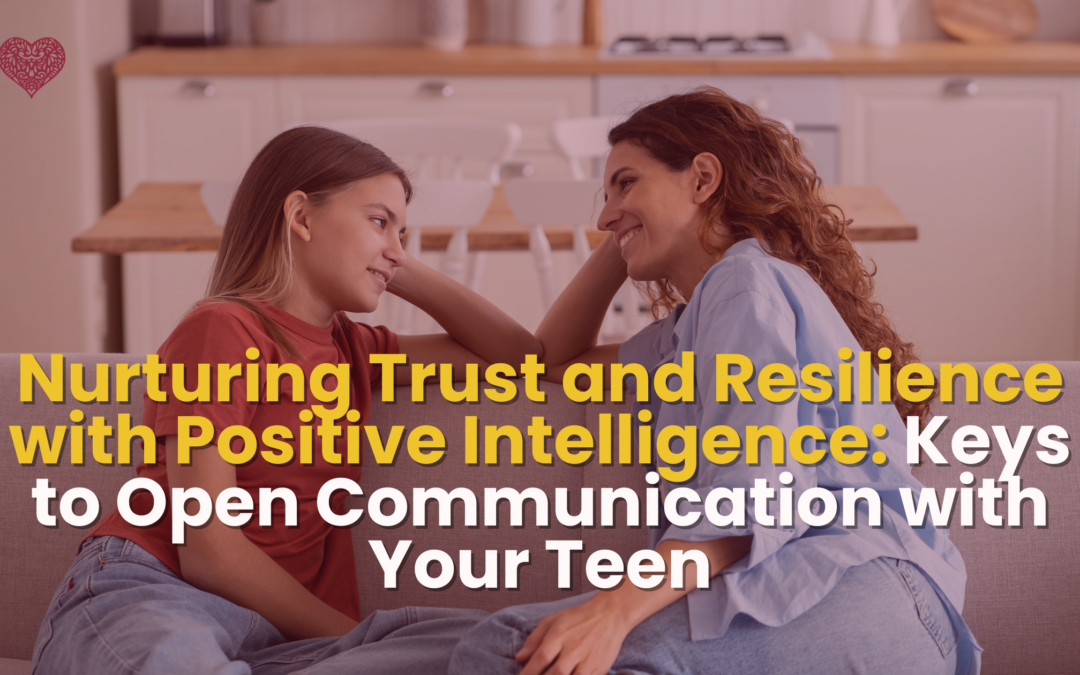Experiencing trust issues with teenagers can be a challenging and emotional journey for parents.There are the frustrating fibs about homework being finished, and then there are the outright lies about their plans.
In my experience, I found that my teenagers began distancing themselves and avoiding discussions about their day when they had new friends of the opposite sex and they didn’t want to deal with my curiosity or judgments. As a parent, discovering that your child has been withholding information can be hurtful and confusing.
Teenagers are at a stage in their lives where they are navigating newfound independence, forming their identity, and testing boundaries. This can sometimes lead to situations where they break trust or withhold the truth from their parents.
In this blog post, we delve into the crucial role of trust and introduce how the concept of positive intelligence can be useful. I’ll offer some up-to-date tips that combine these elements to elevate the sacred bond between parents and teens.
The Crucial Role of Trust:
One common scenario is when a teenager starts to keep secrets about their activities or social life. Parents may notice a change in behavior, such as being secretive about where they are going, who they are with, or what they are doing. This can be particularly distressing for parents who have always been accustomed to open communication with their children.
Parents often grapple with questions like, “Why didn’t my child feel comfortable sharing this with me?” It’s essential to recognize that the need for privacy and independence is a natural part of adolescence. Striking a balance between respecting their autonomy and ensuring their safety is a delicate dance that parents must navigate.
Trust forms the foundation of any strong relationship. Building trust is instrumental in creating an environment where teens feel comfortable sharing their thoughts, concerns, and experiences. It not only strengthens the parent-child connection but also enables parents to guide their teens through the complexities of adolescence.
Integrating Positive Intelligence:
Positive intelligence refers to the ability to manage one’s thoughts and emotions effectively, thereby building our inner resilience. By building up our Positive Intelligence Quotiant (PQ), we are better prepared to handle stressful situations.
This can play a pivotal role in enhancing trust and communication during challenges with our teens. Confronting the issue requires delicacy and understanding. It requires us to have self-command and be pro-active. Rather than reacting with anger or disappointment, it is crucial to create an environment where open communication is encouraged.
By cultivating our own positive intelligence as parents, we can create a supportive and uplifting atmosphere that encourages teens to express themselves openly.
Up-to-Date Tips for Open Communication:
- Active Listening with Positive Intent:
– Approach conversations after taking a moment of mindfulness to get centered.
– Demonstrate active listening skills to show genuine interest in your teen’s perspective.
– Use positive affirmations to reinforce trust-building moments.
- Non-Judgmental Positivity:
– Stay Curious and cultivate a non-judgmental attitude when discussing sensitive topics.
– Focus on finding the opportunities for growth.
– Emphasize the importance of learning from challenges rather than dwelling on mistakes.
- Empathetic Positivity:
– Acknowledge your teen’s emotions and express understanding.
– After a time, encourage the big picture perspective, emphasizing resilience.
- Respectful Privacy with Positive Boundaries:
– Establish boundaries that respect your teen’s need for personal space.
– Communicate the importance of trust and maintaining positive boundaries.
– Reinforce the idea that respecting each other’s space contributes to a positive relationship.
- Regular Positive Check-Ins:
– Schedule regular one-on-one time to connect positively with your teen.
– Foster positive communication by asking open-ended, “What If” type questions.
– Share positive aspects of your own experiences to create a sense of shared positivity.
- Shared Positive Experiences:
– Openly share positive aspects of your adolescence to create relatability.
– Emphasize the growth and learning opportunities in your own experiences.
– Share what you are grateful for in your daily life.
- Positive Technology Use:
– Leverage technology positively, with mindfulness apps and meaningful podcasts.
– Discuss online safety and the positive impact of responsible social media use.
– Highlight the importance of using technology to enhance, not hinder, relationships.
- Collaborative Positive Problem-Solving:
– Involve your teen in decision-making with a brainstorming approach.
– Encourage a growth mindset toward problem-solving and learning.
– Foster a sense of responsibility through collaborative decision-making.
Rebuilding trust is a gradual process that involves open dialogue, active listening, and setting clear expectations. Establishing consequences for dishonesty while also acknowledging the reasons behind the behavior can help teenagers understand the impact of their actions on trust and relationships.
Incorporating positive intelligence into your parenting approach enhances trust and communication, creating a positive and uplifting environment for your teenager. By combining the essential elements of trust, active communication, and positive intelligence, you empower your teen to navigate adolescence with resilience, optimism, and a deep sense of connection.
In my own journey, patience played a crucial role in rebuilding trust. Consistent efforts to foster a supportive and understanding environment eventually led to more open communication with my teenager. It’s important to remember that these challenges are a normal part of the parent-teen dynamic, and with time, trust can be rebuilt as both parties work towards understanding each other’s perspectives.

